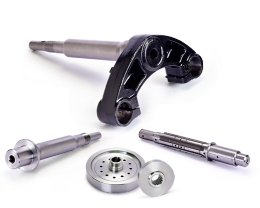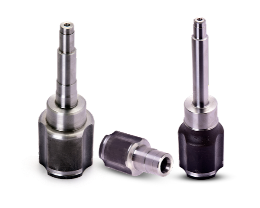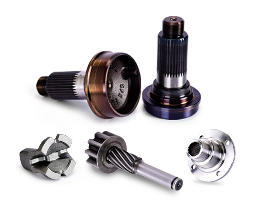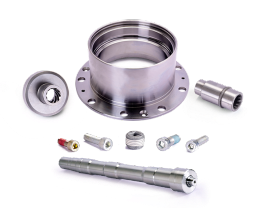FAQs
Manufacturing Industry
We at M/S Singla Forging are a prominent manufacturer, specializing in various forged and turned components, primarily serving the automotive and engineering industries.
Forged Components:
- Cold Forged Components:
- Cold Forged Spline Shafts
- Cold Forged Ball Joints and Tie Rod Ends (ball pins, ball rods, housing for suspension joints)
- Tubular Cold Forming and Forging Components (expertise in piston and cylinder of two-wheeler front forks)
- Warm and Hot Forged Components: They also have facilities for warm and hot forging.
- Formed Components: Including spline shafts.
Precision Machined and Turned Components:
- High Quality Precision Turned Components
- Precision Turned Hydraulic Components
- Cylinder Head Bolts
- Forged Shafts
- Precision Machine Components (various parts requiring high precision)
- CNC Turned Components
- Precision Turned Hydraulic Components
- Tie Rods
- Stem Steering Under Brackets (especially for two-wheeler front forks, with a dedicated assembly line)
Fasteners:
- Standard and Special Fasteners (including screws, bolts, nuts, etc., in stainless steel, carbon steel, and alloy steel)
- Turned Fasteners
They emphasize their integrated manufacturing capabilities, including cold forming processes, CNC machining (hobbing machines for gears), and heat treatment facilities. They cater to both OEMs and the automotive aftermarket.
At M/S Singla Forging, we operate with a robust and adaptable production capacity designed to meet the diverse demands of both the automotive and non-automotive sectors. While specific numerical capacities can fluctuate based on product complexity, material, and required processes (forging vs. machining), we aim to provide a comprehensive understanding of our overall capabilities.
- Raw Material Processing Capability: We have the capacity to process significant volumes of raw materials. For instance, data indicates a capacity for Metal Alloy Rods of up to 50 Metric Tonnes per day for hot and cold forging operations. This directly translates to our ability to produce a high volume of forged components.
- Integrated Manufacturing Facilities: Our capacity is not just about raw material input but also about our integrated processes:
- Cold Forging:We have specialized lines for cold forged components, including spline shafts, ball joints, and tubular components (like two-wheeler front fork parts), optimized for near-net shape production and high precision.
- Warm and Hot Forging: Our modern hot forging plant, added in 2012, complements our cold forging capabilities, allowing us to handle a wider range of component sizes and material properties
- Precision Machining: An extensive fleet of CNC machines and precision turning equipment supports post-forging machining, ensuring tight tolerances and complex geometries are consistently achieved at scale.
- Dedicated Tool Room: Our in-house tool room provides rapid tool and die manufacturing and maintenance, critical for minimizing downtime and maximizing production capacity.
- Flexibility and Scalability: Our production setup is designed for flexibility, allowing us to:
- Allocate resources and adjust production lines to accommodate high-volume orders for mass-market applications.
- Reconfigure processes for smaller, specialized batches—especially for heavier or custom-designed components—maintaining efficiency and quality at all production scales.
- Overall Throughput: While daily output varies by component size, complexity, and process, our substantial raw material intake and comprehensive manufacturing setup enable us to deliver millions of components annually across our product range to OEMs and Tier 1 customers.
We are committed to continual investment in upgrading our machinery and optimizing processes, ensuring M/S Singla Forging remains a leading and reliable supplier in the automotive components industry and beyond. For detailed project capacity assessments, please contact our sales and engineering teams directly.
Yes, we offer custom manufacturing solutions. If you have specific requirements or designs, our engineering and production teams will work closely with you to develop a solution that meets your needs.
At M/S Singla Forging Pvt. Ltd., our extensive experience in precision component manufacturing means we work with a diverse range of materials, selected to meet the specific performance, durability, and cost requirements of each application. Our material expertise spans both ferrous and non-ferrous metals.
For automotive components, our primary focus is on materials that ensure safety, longevity, and optimal vehicle performance. This includes:
Steels:
- Carbon Steels: (e.g., 10B21, 10B22, C15, C45) Used for general structural components, fasteners, and some forged parts.
- Alloy Steels: (e.g., 20MnCr5, 16MnCr5, 42CrMo4, 34CrNiMo6) Essential for high-strength, high-wear applications like gears, shafts, crankshafts, connecting rods, and suspension components. We also work with case-hardening and through-hardening grades.
- Stainless Steels: (e.g., 304, 316, 410, 420) Utilized for corrosion resistance in exhaust systems, brake components, and certain engine parts.
Beyond the automotive sector, our manufacturing capabilities allow us to apply our material expertise to a wide array of non-automotive components. For these industries, we work with:
- Specialty Alloy Steels: For demanding industrial machinery, aerospace (non-critical parts), and agricultural equipment, where extreme strength, wear resistance, or specific thermal properties are required.
- Tool Steels: For tooling and die manufacturing used in various industries.
- Bronze Alloys: For bearings, bushings, and marine applications requiring corrosion resistance and good tribological properties.
- Other Non-Ferrous Metals: As per specific client requirements for various industrial applications.
We also have in-depth knowledge of material heat treatment processes (e.g., carburizing, nitriding, induction hardening, tempering) and surface finishes to enhance the mechanical properties and corrosion resistance of these materials, ensuring optimal performance for their intended use. Our material selection process is always driven by rigorous engineering analysis and collaboration with our clients to deliver the most effective and efficient component solutions.
As an established auto component manufacturer, our core expertise lies in serving the automotive industry. We currently supply a wide range of critical components to:
- Passenger Vehicle Manufacturers (OEMs): Including components for powertrains
- Commercial Vehicle Manufacturers: Providing robust parts for trucks, buses, and other heavy-duty vehicles.
- Tier 1 Automotive Suppliers: Collaborating to deliver specialized sub-assemblies and systems.
- Automotive Aftermarket: Manufacturing high-quality replacement parts for various vehicle segments.
However, our advanced manufacturing capabilities, precision engineering, and commitment to quality make us highly adaptable. We are actively and enthusiastically exploring opportunities to leverage our strengths in component manufacturing for a broader range of industries. We are particularly open to exploring:
Other Automotive Sectors:
- Electric Vehicle (EV) Manufacturers
- Two-Wheeler Manufacturers: Parts for motorcycles, scooters, and e-bikes.
- Off-Highway and Construction Equipment: Durable components for agricultural machinery, excavators, and other heavy equipment.
- Specialty Vehicles: Components for recreational vehicles (RVs), ATVs, and defence vehicles.
Non-Motive Industries:
- Aerospace (Non-Critical Components): Precision machined parts, brackets, and assemblies where our quality standards align.
- Industrial Machinery: Components for manufacturing equipment, robotics, and automation systems.
- Renewable Energy: Parts for wind turbines, solar tracking systems, and other green energy infrastructure.
- General Engineering & Manufacturing: Custom component manufacturing for diverse applications requiring high precision and reliability.
Yes, we offer product design and prototyping services. Our team of engineers can assist with the design, development, and testing of prototypes before moving into full-scale production.
At M/S Singla Forging, quality is paramount—especially as an automotive component manufacturer handling both forging and machining processes. Our comprehensive quality management system is deeply embedded at every stage, from raw material inspection to final product delivery. We adhere to the most stringent industry standards to ensure the highest level of reliability and performance.
1. Foundation of Our Quality System: IATF 16949 Certification
We are IATF 16949 certified, the international quality management standard for the automotive industry. This certification mandates a process-oriented approach focused on:
- Customer satisfaction: Meeting and exceeding customer requirements.
- Defect prevention: Proactive identification and elimination of errors.
- Continuous improvement: Ongoing enhancement of processes and products.
- Reduction of variation and waste: Increasing efficiency and reducing non-value activities.
We operate with a “Zero Defect” philosophy, aiming to eliminate defects at every production stage.
2. Robust Process Control & Planning (APQP & PPAP)
- Advanced Product Quality Planning (APQP) ensures quality is embedded from the beginning:
- Product Design & Development: Involvement from early stages to ensure manufacturability.
- Process Design & Development: Detailed planning of forging and machining steps.
- Product & Process Validation: Comprehensive validation before full-scale production.
- Production Part Approval Process (PPAP) involves submitting the following to customers:
- Design Records (CAD models, drawings)
- Process Flow Diagrams
- FMEAs (Failure Mode and Effects Analysis)
- Control Plans
- Measurement System Analysis (MSA)
- Initial Process Studies (SPC)
- Appearance Approval Report (AAR)
- Sample Parts for approval
3. In-Process Quality Control (Forging & Machining Specifics)
- Raw Material Inspection
- Material Certification from suppliers
- Chemical Composition Analysis (in-house or third-party)
- Microstructure Analysis for critical forgings
- Non-Destructive Testing (NDT) using ultrasonic techniques
- Forging Process Control
- Die Inspection & Maintenance
- Temperature Monitoring of billet heating
- Dimensional Inspection of forged blanks
- Grain Flow Analysis
- Visual Inspection for surface defects
- Machining Process Control
- Fixture and Tooling Calibration
- First-Off/Last-Off Inspection of batch parts
- In-Process Dimensional Checks using calibrated instruments
- Statistical Process Control (SPC) using control charts
- CNC Program Verification
- Surface Finish Measurement with profilometers
- Heat Treatment Control
- Precise Temperature & Time Control via automated furnaces
- Hardness Testing (Rockwell, Brinell, Vickers)
- Microstructure Examination for metallurgical validation
4. Post-Production & Final Inspection
- 100% Visual Inspection for critical components
- Dimensional Layout Inspection of sample batches
- Functional Testing (e.g., leak, torque, or fatigue testing)
- Non-Destructive Testing (NDT) such as MPI and UT
- Packaging & Traceability: Secure packaging and full traceability from raw material to final product
5. Continuous Improvement & Problem Solving
- 8D Methodology: Structured problem-solving for root cause analysis
- Corrective and Preventive Actions (CAPA)
- Internal Audits: Ensuring compliance with IATF 16949 and internal standards
- Management Review: Regular quality system evaluation by senior management
- Lean Manufacturing: Applying lean principles to reduce waste and improve quality
By integrating these stringent quality processes across our forging and machining operations, we ensure every component leaving our facility meets the highest standards of the automotive industry and satisfies the specific requirements of our diverse clientele.
At M/S Singla Forging, we treat all customer requirements with the highest priority. We believe it’s better to take time and analyze thoroughly rather than rush. The time it takes to produce a custom order can vary significantly — from a few weeks to several months, and in complex cases, even over a year. The duration depends on multiple factors. Here's a breakdown of what influences the timeline:
Key Factors Influencing Production Time for Custom Automotive Components:
- Complexity of the Component:
- Design and Geometry: Highly intricate designs, parts with complex curves, tight tolerances, or multiple integrated features require more time for design, prototyping, and manufacturing setup.
- Functionality: Components with critical safety implications or complex functional requirements (e.g., precise hydraulic components, critical engine parts) require rigorous testing and validation, extending the timeline.
- Design & Prototyping Phase:
- New Design vs. Modification: New designs require extensive CAD modeling, simulation, and multiple prototyping iterations. Modifications are typically quicker.
- Prototyping Method: Rapid prototyping (e.g., 3D printing) enables fast sample creation, but functional prototypes often require actual manufacturing, which takes longer. This phase can take 3–12 months for A, B, and C samples.
- Material Selection and Availability:
- Standard vs. Specialty Materials: Standard materials have shorter lead times. Specialty alloys or grades needing custom production extend timelines.
- Material Processing: Specific treatments (heat treatments, coatings, forming) add time to production.
- Manufacturing Process:
- Forging, Machining, Stamping, Moulding: Each has its inherent lead times.
- Tooling (Dies, Molds): Creating custom tooling can take weeks to months.
- Machining: CNC machining is faster for prototypes and small batches, but complex parts take longer.
- Secondary Operations: Heat treatment, finishing (anodizing, plating), assembly, and testing extend overall time.
- Forging, Machining, Stamping, Moulding: Each has its inherent lead times.
- Volume and Production Scale:
- Low Volume/Prototype: Focus is on speed to validate the design.
- Medium/High Volume: Requires setup for efficient production lines and quality control, which is time-intensive upfront, but faster once operational.
- Quality Assurance and Testing:
- Includes in-process inspections, material and functional testing, and environmental testing (temperature cycling, vibration).
- Complies with industry standards like IATF 16949 and specific OEM requirements.
- Supply Chain Efficiency:
- Raw Material Procurement: Delays in sourcing materials can halt production.
- Sub-component Sourcing: Lead times from other suppliers can impact the schedule.
- Logistics and Shipping: Especially critical for international supply chains.
- Customer Communication and Approvals:
- Prompt feedback and approvals at every stage (design, prototype, pre-production) are essential to stay on schedule.
Typical Stages and Estimated Times (Highly Variable):
- Concept & Design Review: 2–4 weeks
- Detailed Engineering & CAD Modelling: 4–12 weeks (depending on complexity)
- Tooling Design & Manufacturing: 8–20 weeks
- Prototyping & Initial Sample Production (A-Sample): 4–12 weeks (often overlaps with tooling)
- Testing & Validation (B-Sample, C-Sample): 6–24 weeks (multiple iterations possible)
- Pre-Production Run & Process Validation: 2–8 weeks
- Full-Scale Production (Initial Run): 2–4 weeks after validation (depends on volume)
This breakdown reflects industry standards. At M/S Singla Forging, our efficient and dedicated team is committed to optimizing resources to deliver the best results within a reasonable timeframe.
Yes, we can arrange for international shipping. Shipping fees, delivery times, and customs requirements depend on the destination and order size. Please reach out for specific details on shipping options and costs.
Yes, we offer samples for most of our products. Please contact us to request a sample, and we will provide you with information on availability and costs.
Absolutely. At M/S Singla Forging, we are strategically structured to flexibly scale our production capabilities to align precisely with your business needs—whether you require smaller, specialized batches or high-volume mass production.
Our Approach to Production Scaling
- For Smaller Quantities (typically for components weighing over 5–6 kg):
We are well-equipped to handle smaller production runs, particularly for heavier, more specialized components. Our processes are optimized to deliver precision and quality even at lower volumes, making us ideal for niche applications, initial prototypes, or components used in specialized machinery where weight and robustness are critical. - For Larger Quantities (starting with any weight):
Our facilities are designed for efficient, high-volume production. We can seamlessly transition from development to large-scale manufacturing for components of any weight, ensuring consistent quality and timely delivery to meet mass production demands.
Important Note on Development Costs
Regardless of the order size or component weight, development costs are mandatory for all new product orders. This essential investment covers:
- Engineering design and optimization.
- Tooling and die development (forging dies, machining fixtures).
- Prototyping and sample validation.
- Process setup and initial quality assurance.
This upfront cost ensures that we can develop and validate a robust, repeatable manufacturing process tailored specifically to your custom component—guaranteeing performance and quality before full-scale production begins.
Our goal is to be a responsive and reliable manufacturing partner, adapting our capacity to support your evolving business requirements—from initial concept to high-volume supply.
To request a quote for a new product from M/S Singla Forging, we’ve made the process straightforward and efficient, offering you two convenient ways to get in touch with our team:
1. Through Our Website Inquiry Page (Recommended for Detailed Submissions)
The most effective way to initiate a new product inquiry is by visiting the “Request a Quote” or “Inquiry” section on our official website. This dedicated page is designed to capture all the essential details we need to provide you with an accurate and timely quote.
When using the website form, please be prepared to provide:
- Your company details and contact information.
- A brief description of the new product/component.
- Relevant technical specifications, material requirements, or desired performance characteristics.
- If available, engineering drawings (CAD files, PDFs) or 3D models to aid our assessment.
- Estimated annual volume requirements.
- Target launch date or desired lead time.
Submitting via our website ensures your inquiry is routed directly to the relevant technical and sales personnel for immediate review and action.
2. Directly Contact Our Authorized Personnel
If you prefer a more direct approach or have initial questions before a formal submission, you may contact our authorized sales and technical representatives. They are well-versed in our capabilities for both automotive and non-automotive components and can guide you through the initial steps.
You can find the direct contact information for our sales and new-product-development team on our website’s “Contact Us” page.
What Happens Next Once we receive your inquiry, our team will review the provided information. For new product requests, this often involves a thorough technical feasibility study by our engineering department, followed by a detailed costing analysis. We aim to respond promptly with any clarifying questions or directly with a comprehensive quotation tailored to your specific requirements.
We look forward to partnering with you on your next innovative product development project!
At M/S Singla Forging, our commitment to our customers extends far beyond the point of sale. We understand that the performance and reliability of our forged and machined components are critical to your end products, whether in the automotive sector or other industries. Our after-sales service is designed to provide comprehensive support, ensuring your continued satisfaction and success.
How We Support Our Clients After Delivery
1. Dedicated Technical Support
- Our team of experienced engineers and technical specialists is available to assist with any queries related to component performance, installation, or integration into your systems.
- We offer guidance on best practices for handling, assembly, and maintenance of our components to maximize their lifespan and performance.
2. Continuous Feedback and Improvement Loop
- We actively solicit feedback from our customers on component performance, delivery, and overall service. This feedback is directly integrated into our continuous improvement initiatives.
- Through regular communication, we aim to understand your evolving needs and proactively adapt our processes and product offerings accordingly.
3. Supply Chain Continuity & Replenishment
- For ongoing production needs, we collaborate closely with clients to forecast demand and ensure timely replenishment of components.
- Our robust production planning and inventory management systems are designed to maintain consistent supply—even for custom-ordered parts.
4. Long-Term Partnership & Collaboration
- We view after-sales service as a vital part of building strong, long-term partnerships. Our goal is to be a reliable, responsive supplier you can depend on for all your component needs.
- Whether for current projects or future developments, in automotive or non-automotive sectors, we are committed to supporting your success throughout the entire product lifecycle.
For any after-sales support, please reach out to our dedicated Customer Service or Technical Support teams. We ensure your needs are addressed promptly and effectively.
We are committed to sustainability and reducing our environmental footprint. Our manufacturing processes incorporate [list sustainable practices such as waste reduction, energy-efficient equipment, use of recyclable materials, etc.]. We strive to continually improve our environmental impact.




